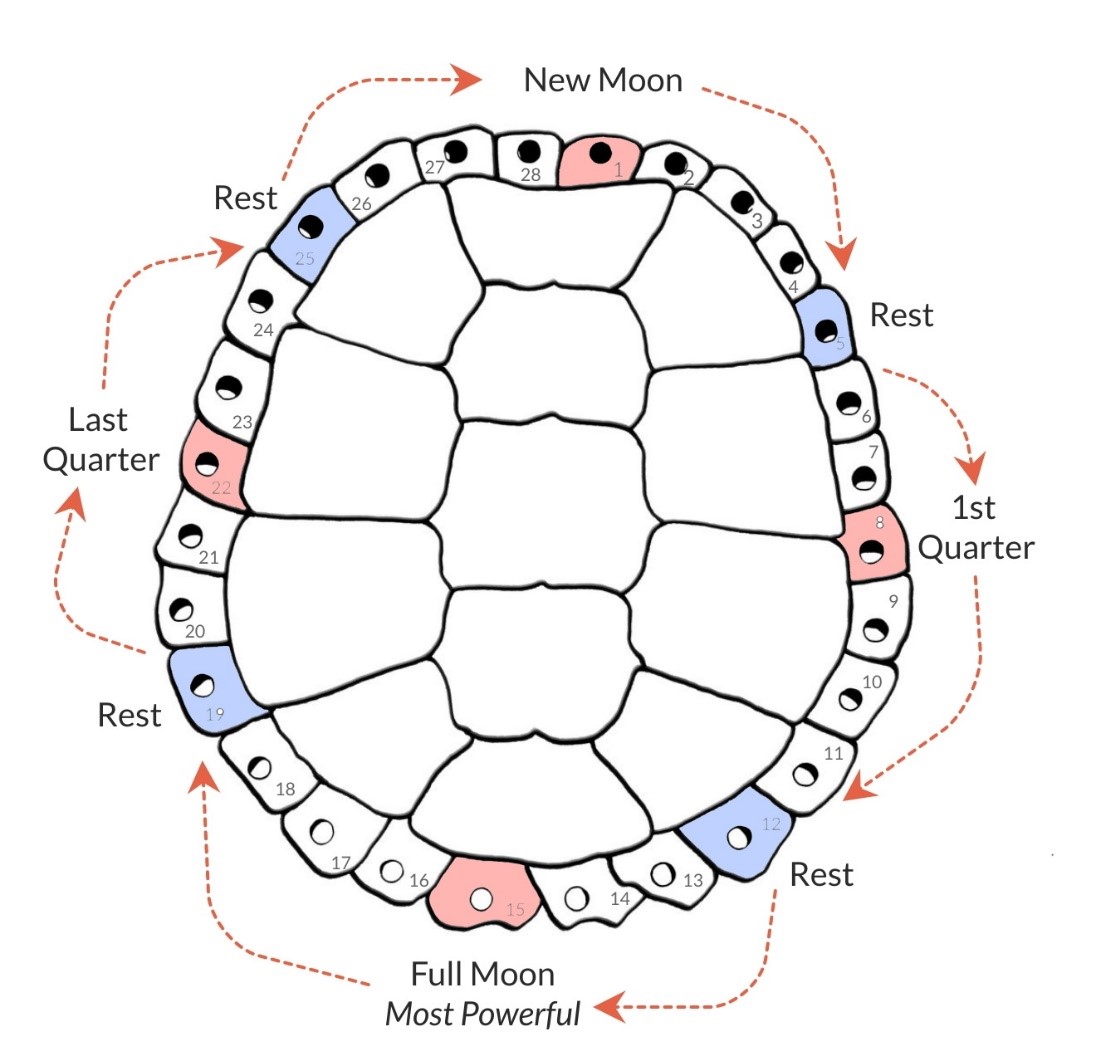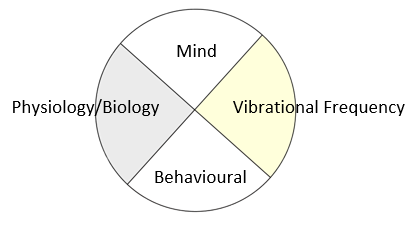10
Learning Objectives
Enhancing self empowerment to determine personal values and leadership qualities to for anti oppressive social work practice.
- Defining & recognizing emotions through a self awareness exercise;
- Recognize personal approaches through self management; and
- Exploring empathy practices.
Grandmother Moon
Grandmother Moon has a direct relationship with water. Human’s biological makeup is majority of water, the same as Mother Earth. Dr. Masaru Emoto’s “The Hidden Messages in Water” explains the connection of emotions to water and plants, humans and the earth. A scientist that was able to explain what Indigenous people already knew and practiced since the original instructions.
 The four (4) phrases of the moon have a cycle it passes through every 7 days, for a total of 28 days. These cycles are: New Moon, 1st Quarter, Full Moon and Last Quarter.
The four (4) phrases of the moon have a cycle it passes through every 7 days, for a total of 28 days. These cycles are: New Moon, 1st Quarter, Full Moon and Last Quarter.
Three (3) days prior to each moon phrase is the time that energy builds. This is the time when emotions, tempers and irritation can mount, peaking on each of the 4 moon cycles (pink). The Full Moon is when it is at it’s most power and influential over the water.
After the peak, it then continues the cycle 3 days past to release and tension subsides, with a rest day (blue) in-between the time of building.
This cycle is continuous.
The more conscious we are of the influence of Grandmother Moon, the more conscious we are to each other. When we come to a place of understanding, empathy and the ability to process, then lateral violence and other forms of negativity decreases.
This is another tool for our toolbox to promote Good Minds and stress management.
Emotional Intelligence
- Based on facilitator’s knowledge, this section can be expanded and elaborated.
- Go over the following list and give examples of appropriate forms of how to approach community members from personal experience.
- Potentially a great place to practice by role playing.
Relationships
Indinawe maaganidog – All My Relations
In order to be aware of other people’s shame, you need to be aware of your own first. Emotional intelligence is about this awareness in self and others. There are four areas to concentrate on:
Modified from the OACAS Emotional Intelligence Essentials training
- Self Awareness
- Self Management
- Empathy
- Relationship Management
Self Awareness
To be aware and mindful of Self, this involves the personal “baggage” we carry & how it effects an individual and how to “regulate” our thoughts and emotions. This speaks to the level of our relationships, especially with the immediate peoples in our lives.
- Observe Reactions, learning to listen within self, and connection to spirit.
- Pay attention to own activation, what is my body saying?
- Where do you feel it in your body?
2. Why;
-
- What happened?
- How did it Make you feel?
3. Observe Triggers
-
- What is yours?
- What is theirs?
4. Recognizing Emotions
-
- Need to be able to identify with our own feelings and emotions to receive or identify in others.
- Need to identify to be able to Communicate Emotion.
- Need to be able to identify and articulate what we are feeling to move it
5. What is the other person’s body language saying, pay attention (empathic miss).
6. Iceberg effect, example of shame and grief are hard to express, they turn up as anger and silence on top of iceberg.
{insert link to iceberg image}
What is emotion?
Emotions are energy at a cellular level, which has a vibrational frequency and moves within the body. It is the motion of emotion that changes form from one emotion to another. The higher vibrational frequency, greater the cellular life force will be which enables expansion or growth.

Vibrational Frequency
- Energy is constantly flowing within our bodies;
- At cellular level, Emotion is Motion.
Behavioural
- Energy can be expressed and released or repressed and held within the body;
- Outward vs Inward, Expression or Repression.
Physiology/Biology
- This is what we feel. When energy is not released and held within body, it becomes stored and can turn into blockages.
- Physical Sensations/Feelings, Hormones & Neurotransmitters “stored stagnate energy becomes blockages.”
Mind
- How we make sense of it all, our worldview (perception/interpretations). The “stored stagnant energy” that is not released (blockages) can become the emotional pain. It is the triggers from our shame (feelings of unworthiness, I don’t deserve etc.), that we think come from outside of us, but it really comes from within us; and is tied to unresolved grief and trauma from our past.
- Mind is activity: Sensory-perceptual interpretations, Identifying to self & others, memories Perception & interpretation activity from stored energy blockages emotional pain – triggers.
How many emotions can you name? Exercise
This activity is to help participants further explore their personal approach to community members and communicating our emotions and needs.
An emotional gauge is really about vibrations. It is fundamental and a skill to communicate an emotion:
- Ability to identify it; and
- Ability to define it.
- This activity can be done as a whole group or divided into smaller groups.
- Hand out chart paper and markers.
- Ask the group(s) to list as many emotions as they can, but to try and list at least 30. Allow for discussions (5 mins to get into groups, 5 mins to make a list).
- While groups are discussing, prepare poster paper that is tacked to the wall one above the other.
Bring back together, ask groups to go over their list. Write positive emotion on top paper, write negative on bottom paper. Pay attention to what is a behaviour vs emotion. Step further, ask them to define what that emotion means and give an example.
Positive Emotions, heightens vibrations: |
|||
| Enlightenment
Joy Love Passion Enthusiasm Hopefulness Contentment |
Peace
Freedom Empowerment Eagerness Optimism Belief Positivity |
Excited
Confident Happy Excited Belonging Empathy Gratitude |
Surprise
Curious |
Negative Emotions, lowers vibrations: |
|||
| Anger
Depression Anxious Rage Jealously Disappointed Worried Sad Overwhelmed |
Guilt
Shame Insecurity Powerlessness Hopeless Embarrassment Desire Hurt Regret |
Pessimism
Irritation Doubt Frustrated Hatred Impatient Grief Humiliation Vulnerability |
Greed
Fear/Sacred Isolation Disgust Institutionalized Blame Judgement Lonely
|
Self Management
This refers to a person’s “control” over themselves. Do emotions control you, or do you control your emotions? Using Anishinaabe teachings of the Seven Grandfather virtues that directly illustrates how to navigate through our emotions and behaviours. Brené Brown gives an examples using the acronym B.R.A.V.I.N.G. that gives a deeper example to managing emotions to better serve our wellbeing; while working with other people. This examples fits perfect with the Seven Grandfather Teachings below.
This is the difference between “knowing” and “practicing.” A person can “know” all kinds of information, or feel that they have an understanding. When actions are put into practice, and become routine; then “knowing” heightens to a whole other level and becomes ingrained into our consciousness.
Seven Grandfather Teachings
Debwewin: Truth, Speaking the truth
|
Minaadendamow: Respect, to go easy on
|
Nibwaakaawin: Wisdom, to have vision
|
Aakode-ewin: Bravery, has strong heart
|
Gwayakwaadiziwin: Honesty, living in a proper way
|
Dabaadendiziwin: Humility: to think lowly of oneself
|
Zaagi’idwin: Love, unconditionally
|
7 Grandfather Self Reflection Exercise
Opportunity for participants to further explore their understanding of the Grandfather virtues. Invite participants to reflect back on their experiences and give examples of where they understood each virtue to it’s fullest. This can be personal examples or can ask for professional examples.
{insert link to example}
{insert link to blank template}
Empathy
Empathy is “understanding other people’s reactions; it is perspective taking (keeping privilege in check) and to see the world as others see it.” Brené Brown, Dare to Lead
The Original instructions to the Anishinaabe is of kindness and gratitude to appreciate who we are, an all of our relations. We have ceremonies to honour and acknowledge these relationships.
- Practicing Empathy – Become the listener and the learner, NOT the knower
-
- Anishinaabe is an oral Cultural, different type of listening;
- Active Listening, Body Language: let go of needing to “fix it;”
- How reactions may affect you & others (remembering the 4P’s Perception, Power & Privilege, and Purpose);
- Stay engaged;
- Stay curious;
- Stay connected;
- Validating every step;
- Most Important Words to hear in struggle, “me too & you are not alone.”
- Having the courage to step in and be vulnerable.
2. Our viewpoint or worldview comes from our history and our experiences. We can only try and see from someone else’s viewpoint.
-
- 4P’s (Perception, Power, Privilege, and Purpose)
- Pay attention to how you are present – 6 Empathy Misses
Skill Building Questions for Empathy
Great opportunity to role play.
- On a scale from 1 – 10, how do you rate your empathy skills?
- What are your strengths?
- What are your barriers?
- What emotions comes up for you when your sharing meets one of these barriers, and how does that affect your connection with the person?
Facilitator Tip:
Can use the link below to Brene Brown’s 6 Empathy Misses, to explore the act of sharing and receiving with participants. Taking a step further, can ask the group to do some role playing with the different Empathy misses.
- When you think about those six types of empathy misses, are there one or two that shut you down?
- Are there one or two responses that you typically use that you need to change?
Relationship Management
What tools do you have in your bundle?
- Accountability and the responsibility to own actions and the consequences
-
- To atone, to become at-one
2. Leadership: trust, motivate, inspire, influence, communication, building people up
-
- Feed people’s inner fire (heart)
- To know worker and where they fit for optimal performance (connection)
- Mentorship to guide & help, apprentices (helpers)
- Teamwork – cooperation & collaborate
3. Don Miguel Ruiz’s Four Agreements: https://www.miguelruiz.com
-
- Be Impeccable with Your Word: speak with integrity. Say only what you mean. Avoid using the word to speak against yourself or to gossip about others. Use the power of your word in the direction of truth and love.
- Don’t Take Anything Personally: Nothing others do is because of you. What others say and do is a projection of their own reality. When you are immune to the opinions and actions of others, you won’t be the victim of needless suffering.
- Don’t Make Assumptions: Find the courage to ask questions and to express what you really want. Communicate with others as clearly as you can to avoid misunderstandings, sadness, and drama. With just this one agreement, you can completely transform your life.
- Always Do Your Best: Your best is going to change from moment to moment; it will be different when you are healthy as opposed to sick. Under any circumstance, simply do your best, and you will avoid self-judgment, self-abuse, and regret.
- a 5th added by Lawrence W. Jourdain
- Always be good with Creator and all of creation.
Media Attributions
- Grandmother Moon Cycle
- 4 Components of Emotions